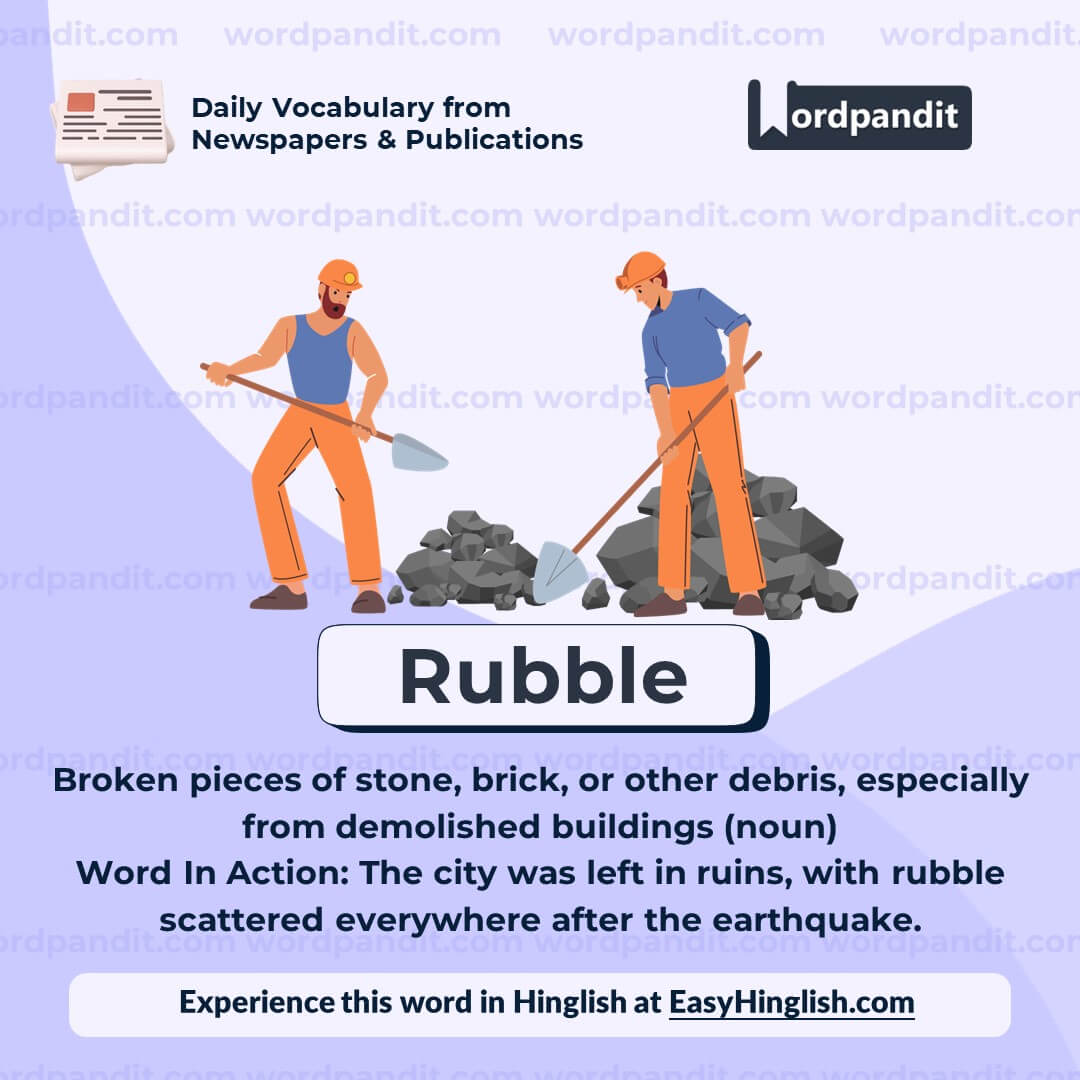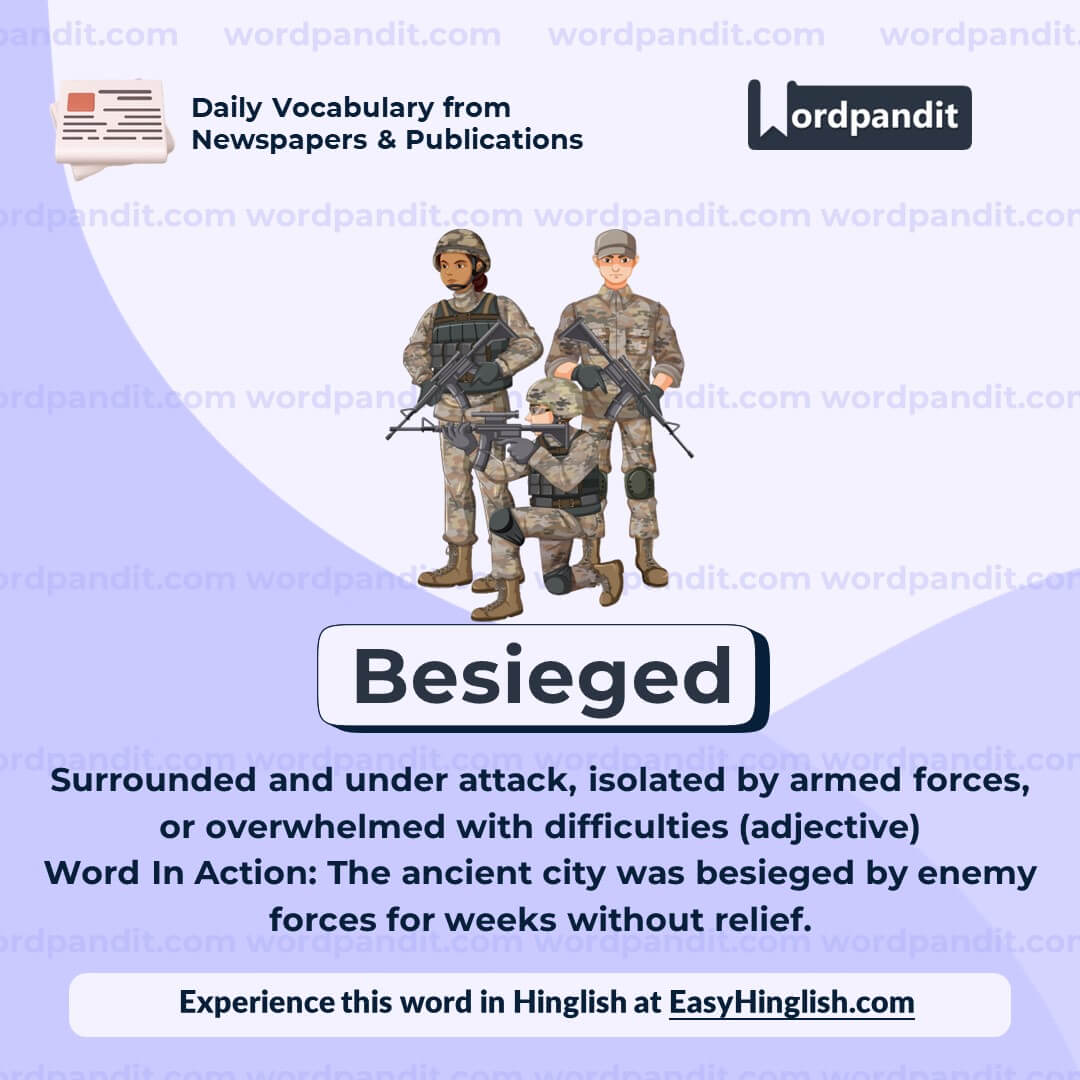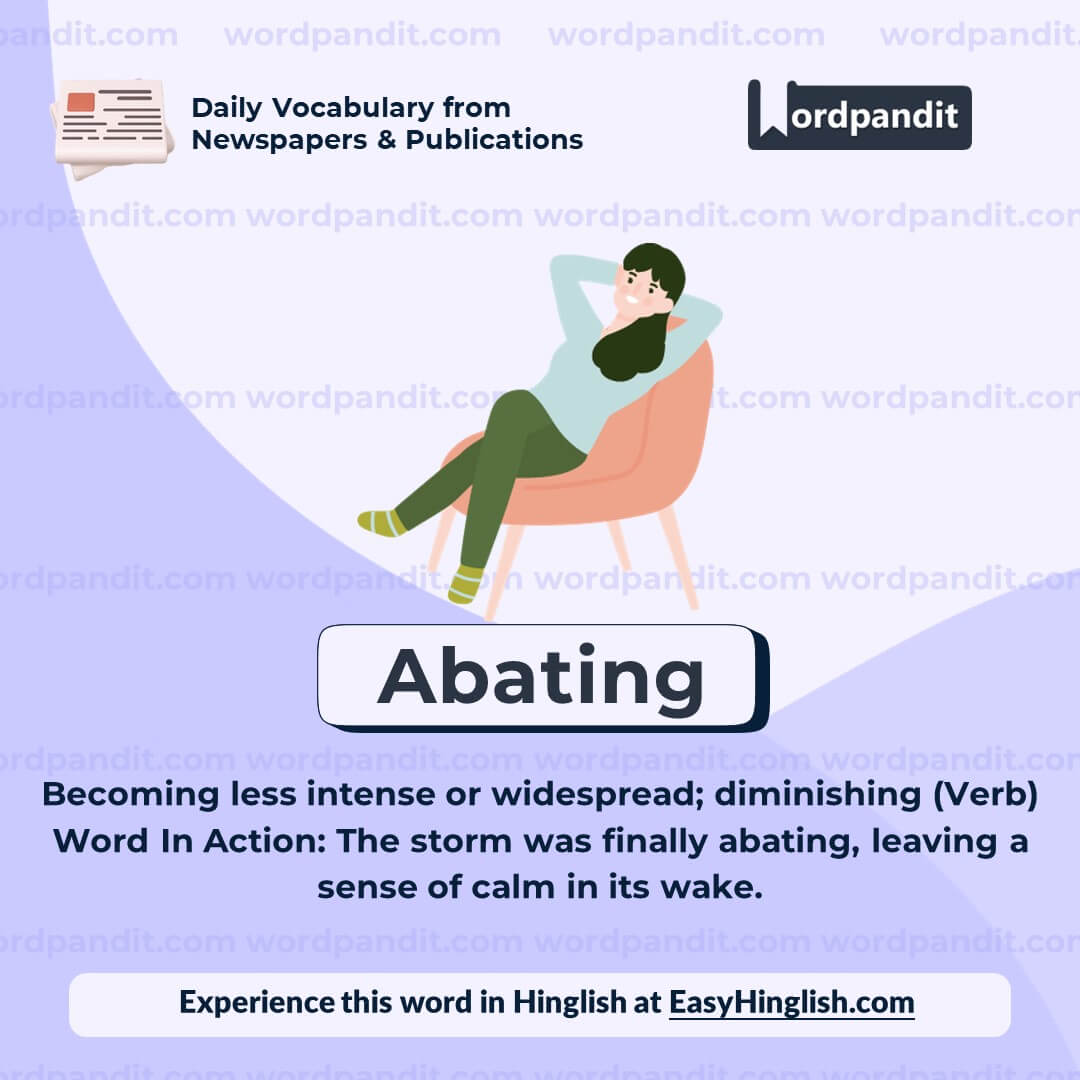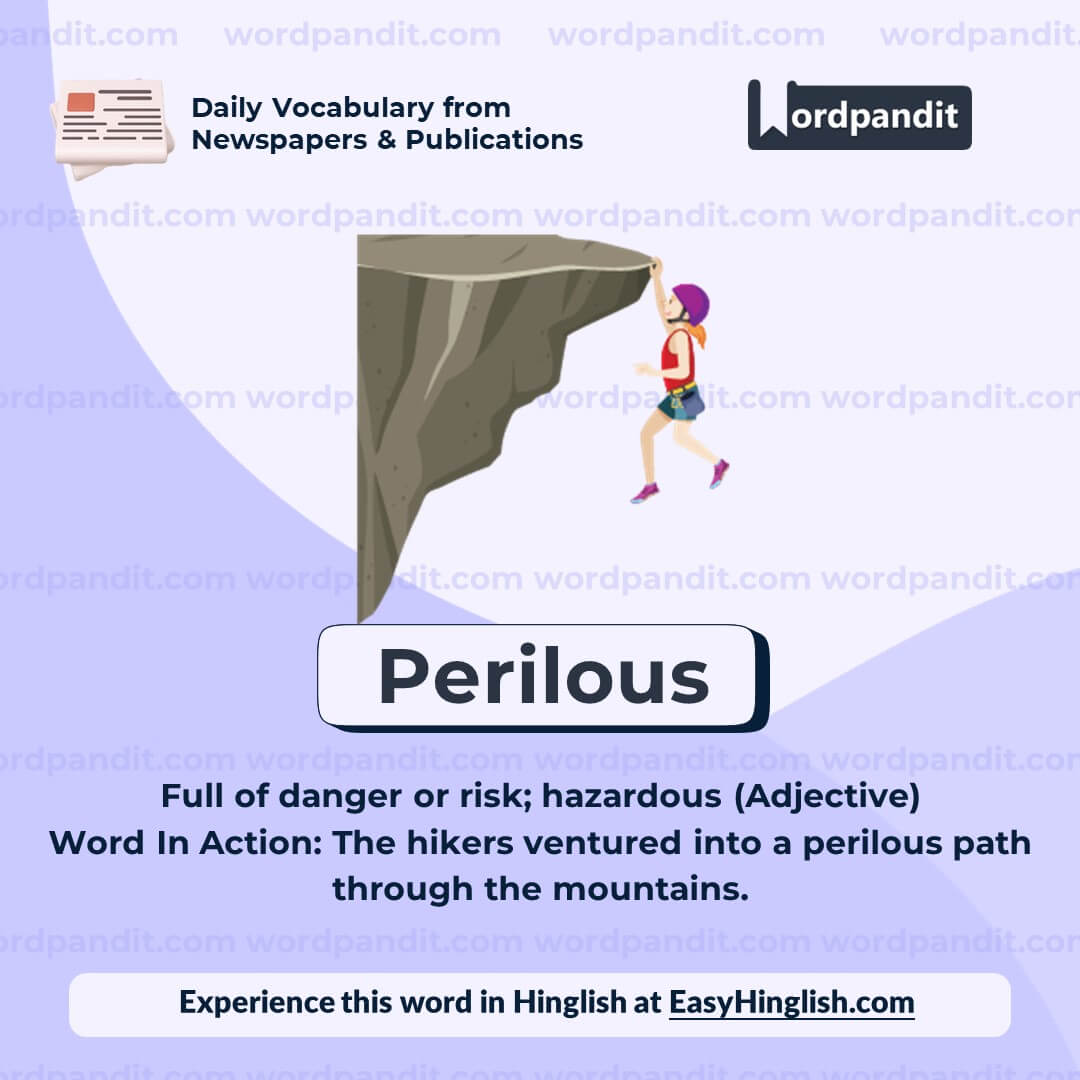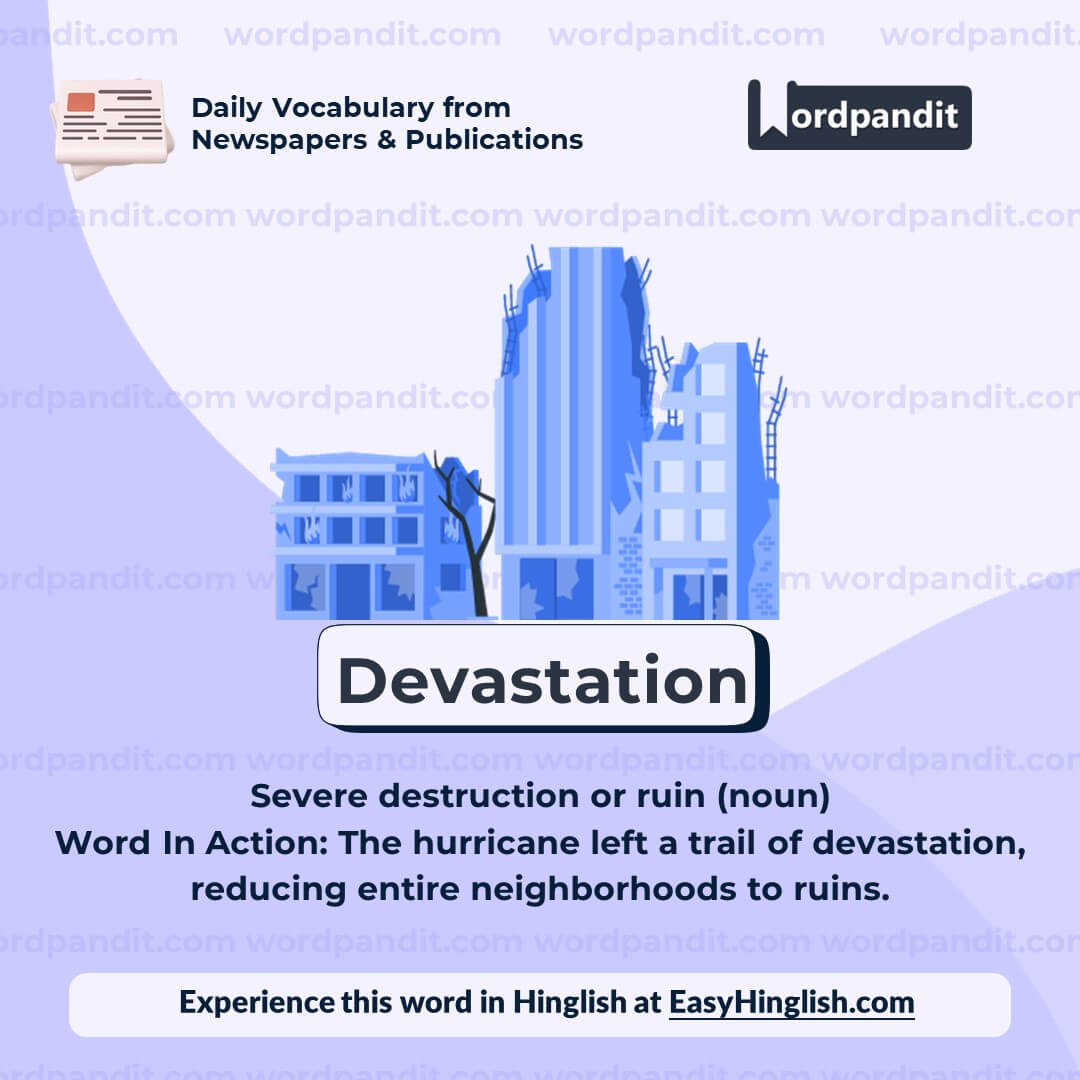Daily Vocabulary from Indian Newspapers and Publications
Welcome to Wordpandit’s Indian Vocabulary Hub
At Wordpandit, we understand the importance of staying rooted in the local context while expanding your language skills. This section focuses on enriching your vocabulary with words and phrases drawn from India’s leading newspapers and publications, ensuring you're learning vocabulary that is practical, relevant, and uniquely Indian.
Why Indian Sources Matter
We believe that the best way to master any language is by immersing yourself in local content. That’s why we carefully curate vocabulary from top Indian publications, including:
- The Hindu
- The Times of India
- The Economic Times
- Hindustan Times
- Live Mint
- The Indian Express
- And many others...
Stay Updated, Stay Relevant
With daily updates from Indian news sources, you’ll be consistently learning words that reflect the trends and shifts in Indian society and culture. Our focus is to provide vocabulary that enhances your understanding of the language in an Indian context.
How Wordpandit Supports Your Goals
Whether you’re preparing for exams, aiming to improve your professional communication, or simply want to stay connected with the latest Indian vocabulary, Wordpandit is here to guide you every step of the way.
Learn with a Practical Approach
Our interactive learning methodology includes real-world examples, engaging activities, and context-specific usage to ensure that every word becomes part of your active vocabulary.
Dive into Indian Vocabulary Today!
Why Choose Wordpandit?
Practical Learning: Focus on words you'll actually encounter in real-world reading, enhancing your comprehension and communication skills.
Diverse Content: From current affairs to scientific breakthroughs, our varied sources expose you to vocabulary across multiple domains.
Effortless Integration: Make Wordpandit a part of your daily routine. Just a few minutes each day can significantly boost your lexicon over time.
Your Path to Vocabulary Mastery
- Visit our Daily Vocabulary section regularly
- Explore new words and their usage in context
- Practice incorporating these words into your own writing and speech
- Track your progress as your vocabulary expands
Start Your Journey Today
Embark on your vocabulary enhancement journey with Wordpandit. By consistently engaging with our daily posts, you'll build a robust vocabulary that serves you well in academic, professional, and personal contexts.
Remember, a word a day keeps linguistic limitations at bay. Make Wordpandit your daily companion in the quest for vocabulary excellence!
WORD-1: Rubble
Context:
"Entire villages appear to have been reduced to rubble, with trees growing in places where houses once stood." - The Wire
Explanatory Paragraph:
Rubble refers to broken pieces of stone, brick, or other materials that remain after a building has been destroyed or heavily damaged. It often symbolizes destruction, but it can also represent the potential for rebuilding and renewal.
Meaning: Broken pieces of stone, brick, or other debris, especially from demolished buildings (noun).
Pronunciation: ruh-buhl
Difficulty Level: ⭐⭐ Beginner
Etymology: Derived from Middle English, possibly from Old French "robeler," meaning to break into pieces, or from Latin "rudere," meaning to roar, hinting at the sound of collapse.
Synonyms & Antonyms:
Synonyms: Debris, wreckage, ruins, detritus
Antonyms: Structure, construction, edifice, creation
Usage Examples:
- The rescue teams sifted through the rubble in search of survivors after the earthquake.
- The old castle was now just a pile of rubble overgrown with moss.
- After the bombing, the city center was reduced to rubble.
- Workers cleared the rubble to lay the foundation for the new building.
Cultural Reference:
"Rubble has often been a recurring theme in literature and cinema, symbolizing destruction and resilience. For instance, in post-apocalyptic movies, the imagery of rubble serves to show the aftermath of catastrophic events." - Film Studies Journal
Think About It:
How does the presence of rubble in a scene affect your perception of the events that occurred there? Does it symbolize loss, hope, or both?
Quick Activity:
Find a picture of a place reduced to rubble and write a short story about what might have happened there, incorporating the word 'rubble' creatively.
Memory Tip:
Remember "rubble" by associating it with the word "trouble." When buildings face trouble, they often turn into rubble.
Real-World Application:
Rubble is commonly used in disaster management, construction, and archaeology contexts. It often points to areas requiring aid or rebuilding, making it an essential term in discussions of resilience and recovery.
WORD-2: Besieged
Context:
"Instead, Israeli authorities continue to actively block MSF and other humanitarian organisations from providing lifesaving assistance to people besieged and bombarded." - The New Indian Express
Explanatory Paragraph:
Besieged refers to a situation where a place or group of people is surrounded and under attack or severe pressure, often cutting them off from supplies or assistance. It can also describe a state of being overwhelmed by problems, challenges, or distress.
Meaning: Surrounded and under attack, isolated by armed forces, or overwhelmed with difficulties (adjective).
Pronunciation: bih-seejd
Difficulty Level: ⭐⭐⭐ Intermediate
Etymology: Derived from the Old French "sege" meaning seat or siege, and later from Middle English, referring to the act of surrounding with intent to capture or subdue.
Synonyms & Antonyms:
Synonyms: Surrounded, encircled, hemmed in, under attack
Antonyms: Liberated, free, assisted, supported
Usage Examples:
- The besieged city struggled to survive as supplies dwindled.
- She felt besieged by the mounting pressure of deadlines at work.
- The besieged villagers sent messages pleading for help.
- In history, many fortresses remained besieged for months before surrendering.
Cultural Reference:
"Besieged" often appears in historical and literary works, such as Shakespeare’s plays, where cities under siege serve as metaphors for political and emotional turmoil.
Think About It:
How does the concept of being besieged apply to modern-day challenges, such as cyberattacks or environmental crises?
Quick Activity:
Write a diary entry from the perspective of someone living in a besieged city, focusing on their emotions and daily struggles.
Memory Tip:
Think of "besieged" as "be-seized," imagining a place or person being seized and surrounded.
Real-World Application:
The word is commonly used in reports on conflict zones, humanitarian crises, and even in business or personal contexts to describe situations of overwhelming pressure or attack.
WORD-3: Abating
Context:
"It has since evolved into a series of retaliatory attacks, creating a cycle of unrest that shows no signs of abating." - The Wire
Explanatory Paragraph:
The word "abating" refers to the process of something diminishing in intensity, strength, or severity. It is often used when describing situations, emotions, or phenomena that are gradually lessening or becoming less intense over time.
Meaning: Becoming less intense or widespread; diminishing (Verb)
Pronunciation: uh-BAY-ting
Difficulty Level: ⭐⭐⭐ Intermediate
Etymology: Derived from the Old French word "abatre," meaning "to beat down," and from the Latin "battuere," meaning "to beat."
Synonyms & Antonyms:
Synonyms: Subsiding, diminishing, waning, lessening, alleviating
Antonyms: Intensifying, escalating, increasing, heightening
Usage Examples:
- The storm showed signs of abating by evening, giving hope to the stranded travelers.
- Her anger began abating after he sincerely apologized.
- The medicine helped in abating the patient's severe pain.
- The protests continued for weeks without abating, forcing the government to respond.
Cultural Reference:
"Abating" is often used in news headlines to describe the gradual decrease of crises, such as "Floodwaters Abating as Rescue Efforts Continue." It is a term associated with hope and relief in difficult situations. - General Media Usage
Think About It:
Can "abating" always signify a positive outcome, or are there scenarios where it might have a neutral or even negative connotation?
Quick Activity:
Identify a recent situation in your life or in the news where something was "abating." Write a short paragraph describing the scenario using the word correctly.
Memory Tip:
Remember "abating" by associating it with "a bait" that calms fish—it helps you picture something reducing or lessening in intensity.
Real-World Application:
"Abating" is commonly used in everyday language to describe diminishing pain, conflict, or intensity. For example, you might say, "The noise in the room is finally abating," to indicate that the sound level is going down.
WORD-4: Perilous
Context:
"These unofficial borders have turned into perilous frontiers, where crossing over can have fatal consequences." - The Wire
Explanatory Paragraph:
The word "perilous" describes something that is full of danger or risk. It is often used to highlight situations, actions, or places where the likelihood of harm, injury, or loss is very high, emphasizing the severity of the threat involved.
Meaning: Full of danger or risk; hazardous (Adjective)
Pronunciation: PEH-ri-luhs
Difficulty Level: ⭐⭐⭐ Intermediate
Etymology: Derived from the Old French word "perilleux," which comes from the Latin "periculum," meaning "danger."
Synonyms & Antonyms:
Synonyms: Dangerous, risky, hazardous, treacherous, precarious
Antonyms: Safe, secure, harmless, protected
Usage Examples:
- Climbing the steep mountain in the storm was a perilous journey for the hikers.
- The economy was in a perilous state after the sudden financial crisis.
- The explorer described his perilous expedition through the uncharted jungle.
- Crossing the narrow, icy bridge was a perilous task for the villagers.
Cultural Reference:
The term "perilous" is often used in literature and film to describe dangerous adventures, such as in J.R.R. Tolkien's "The Lord of the Rings," where characters undertake perilous journeys across Middle-earth. - Literary Tradition
Think About It:
Can you think of a time when taking a perilous risk led to a positive outcome? Why do people sometimes choose to face such dangers?
Quick Activity:
Write a short story of two or three sentences using the word "perilous" to describe a dangerous situation. Share it with a friend or teacher for feedback.
Memory Tip:
Link "perilous" with the word "peril," which means danger. Imagine a warning sign that says, "Peril ahead!" to reinforce the idea of risk.
Real-World Application:
"Perilous" is commonly used in discussions about dangerous professions, extreme sports, or risky decisions. For instance, a reporter might say, "Journalists in conflict zones face perilous conditions daily."
WORD-5: Devastation
Context:
"Following satellite images captured by The Wire reveal the full extent of the devastation. These images were captured in early 2025." - The Wire
Explanatory Paragraph:
Devastation refers to the immense destruction or severe damage caused by events such as natural disasters, wars, or accidents. It conveys the scale of ruin and often evokes emotions of loss, sorrow, and shock.
Meaning: Severe destruction or ruin (noun).
Pronunciation: dev-uh-stay-shuhn
Difficulty Level: ⭐⭐⭐ Intermediate
Etymology: Originates from the Latin word "devastare," meaning to lay waste or destroy, and entered English through Old French in the late 15th century.
Synonyms & Antonyms:
Synonyms: Destruction, ruin, havoc, obliteration
Antonyms: Restoration, rebuilding, recovery, creation
Usage Examples:
- The hurricane left a path of devastation across the coastal towns.
- The war caused untold devastation to the region’s infrastructure.
- Wildfires swept through the forest, leaving utter devastation in their wake.
- The family struggled to recover from the emotional devastation of the tragedy.
Cultural Reference:
In 1945, the atomic bombings of Hiroshima and Nagasaki epitomized human-caused devastation, leaving cities in ruins and marking a turning point in world history.
Think About It:
How can communities balance remembering the devastation of disasters with the need to rebuild and move forward?
Quick Activity:
Look up recent satellite images of disaster-affected areas and describe the devastation you see, using the word in your description.
Memory Tip:
Link "devastation" to "devastate," imagining a vast area laid to waste to visualize the destruction.
Real-World Application:
The term 'devastation' is widely used in media, humanitarian reports, and personal narratives to describe the effects of disasters, making it an essential word in global communication.


